Writing: where it started
Posted on
Background
In this current era there appears to be a need for things to be categorised or allocated nonsensical 'rules' about what is or is not appropriate. In the greeting card industry this has taken things to an arguably daft level, where a card for the wife needs to have 'For My Wife' on it or one for the stepson similarly has to have 'For My Stepson'. It's quite normal for people in these relationships to know full well what they are to each other, so why is it SO important to find something that says it?
In writing, apparently, you've got to be published in your 20s or else you are a freak of nature. Newspapers regularly spout gushing prose of shock and awe at anyone who publishes in their 40s for the first time. Anyone older than that, in the eyes of these not all youthful journalists, appears to be rebellious or overly ambitious.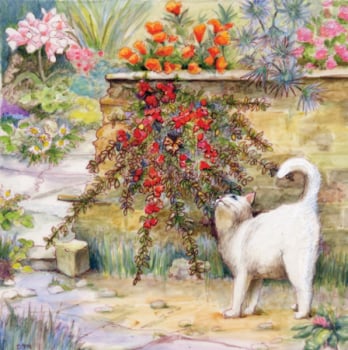 The best writing of any sort comes from having had experiences! There should never be hard or fast rules for when you use those experiences or share them. My mother was an art teacher many years ago and her favourite saying has always been 'an artist is not a special kind of person, every person is a special kind of artist'. As with painting, writing is a craft that requires technique and building confidence. To know 'what you want to say' this trite phrase tormented my landscape training years, I thought it too simplistic. Sad to relate in a way, but I like it now, as without having something to say it's all a bit pointless: In art, writing or design. This isn't the cat sat on the mat sort of level, it's the WHY the cat chose that mat and why that might matter to it in the future. The why anyone reading about the cat would want to know about the mat and if the author wants it to relate to them.
The best writing of any sort comes from having had experiences! There should never be hard or fast rules for when you use those experiences or share them. My mother was an art teacher many years ago and her favourite saying has always been 'an artist is not a special kind of person, every person is a special kind of artist'. As with painting, writing is a craft that requires technique and building confidence. To know 'what you want to say' this trite phrase tormented my landscape training years, I thought it too simplistic. Sad to relate in a way, but I like it now, as without having something to say it's all a bit pointless: In art, writing or design. This isn't the cat sat on the mat sort of level, it's the WHY the cat chose that mat and why that might matter to it in the future. The why anyone reading about the cat would want to know about the mat and if the author wants it to relate to them.
Early days
Writing is something we all do at school, or at least we are expected to do so. At my school our English teacher would select people to read out their essay or poem from the latest crop of homework. Looking back, I realise that I was asked repeatedly to read mine out. At the time I think I thought she was being vindictive, I certainly suffered doing so, but it was one of those rare childhood experiences where I wasn't laughed at by the others, so maybe it wasn't...
My grandmother was also an artist and I remember talking to her about abstract ideas. Interestingly my interest was with words more than images, I wanted to explore the idea of abstract phrasing as it cross-referred to Paul Klee or Mondrian.
In employment
Later, as a landscape architect, I was taking on many tasks; drawing, design, research, writing, compiling, attending meetings, photographing as well as many other things. One memorable day came when I had been tasked to summarise a 30-page archaeological report and add in my own research on the cultural associations of a world heritage site. I think I was also allocated geology to write up, but the main emphasis was the archaeology. The boss knew it was hugely important to the project, but he had not understood a word that the archaeologists had used. My summary was 3 pages. The day in question was a busy one, with many meetings and the boss was out of the office reading various bits of the report in between the sessions. To my astonishment he rang the office, he was so delighted and even excited. This he just did not do! As a result it has stuck in my memory as a confidence boost. He was finally able to understand the archaeology and he liked all the cultural associations stuff as well.
Kicked out of comfort zone
Once I had gone freelance I needed to spend time with other human beings as most of the time was spent working alone. One attempt at this was to go to the Landscape Insitute as a volunteer to use cataloguing skills I had and to rub shoulders with other landscape architects. I allocated a day a month to this and the first few months were very successful. Then in the October all hell broke loose when a particualrly difficult shortfall in funds meant that the archive upon which I was working was scheduled to be broken up/sold off/destroyed. This decision was not made by landscape architects but by people who hadn't a clue about what landscape architecture is about. In retrospect maybe they believed that it was largely digging flowerbeds. A whole group of us decided to fight this decision. In the early stages it involved writing guest blog posts and engaging in industry forums. This experience was extremely defining for the future. It also involved writing letters and membership of a group known as the Reform Group. Since then the Reform Group have become major players within the Landscape Institute and the archive has now been saved by them and is in the hands of Reading University. My role finished fairly early on but I still care about what has been achieved.
Writing practice
Following on from the blogging for the fight to save the archive came a blog of my own, I called Pragmatic Bollards. The concept was to write on subjects that relate to landscape architecture and maybe open a few eyes to the items that we all take for granted, such as bollards. I've got a friend who now photographs bollards wherever she goes on the back of those days.
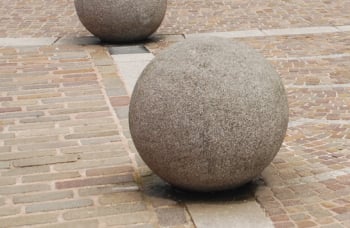 My favourite of these blog posts was one I wrote about a story of ball-bearings as a possible travel technique for the stones at Stonehenge. There is interesting circumstantial evidence for this.
My favourite of these blog posts was one I wrote about a story of ball-bearings as a possible travel technique for the stones at Stonehenge. There is interesting circumstantial evidence for this.
The next blog attempt did not last long. It was called Felicity Terrace and was a daily log of the random activities of our local cats and spiders in a year where flies were a dominant plague. It needed pictures, but it takes time to do that and I was busy with work as well. The most memorable story was of a cat I called Yoda who took it upon himself to teach the other cats how to catch things. He had several disciples and on this occasion he had got them all to stand by individual molehills and he taught them the art of patient watching. For days afterwards they were to be found in various places just sitting watching compost heaps or woodpiles. Extraordinary sight.
Getting into print
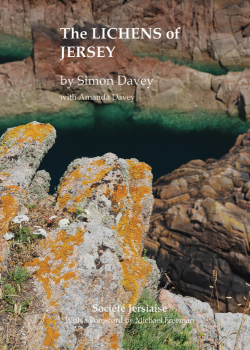 After all these writing experiments and experiences, we had the pleasure of being commissioned to write the book The Lichens of Jersey. I was researching and writing the significant chapter on the history of lichenology in Jersey. The reason we had funding for full colour was because a Jerseyman, Charles du Bois Larbalestier was highly influential in nineteenth-century lichen species identification, having found many new to science. It allowed me to finally break the moulded habit from university days of writing from notes. Instead I wrote from memory in a full flow and THEN went through each and every note to check facts and the order of events. This was enormously liberating.
After all these writing experiments and experiences, we had the pleasure of being commissioned to write the book The Lichens of Jersey. I was researching and writing the significant chapter on the history of lichenology in Jersey. The reason we had funding for full colour was because a Jerseyman, Charles du Bois Larbalestier was highly influential in nineteenth-century lichen species identification, having found many new to science. It allowed me to finally break the moulded habit from university days of writing from notes. Instead I wrote from memory in a full flow and THEN went through each and every note to check facts and the order of events. This was enormously liberating.
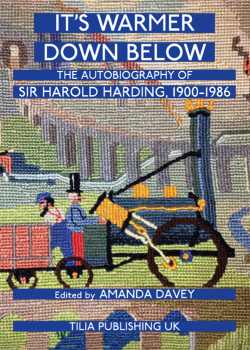 In 2013 an accident meant that I was unable to sit at the computer to work for several months. I was going mad with frustration and boredom until I realised that I could sit in a comfortable armchair with a laptop and keyboard on a board and not get the shooting pains I was getting sitting upright. My grandfather had written his autobiography in the years from 1958-1983 (he died in 1986) and I had promised my father that I would get it published, although never sure when or how. In those painful months I was able to type up the script and sort all papers. I had two extra chapters to write plus also some mini biographies of people involved. After an interesting path, we published the book (It's Warmer Down Below; the autobiography of Sir Harold Harding, 1900-1986) in 2015, a couple of months after the Lichens of Jersey came out.
In 2013 an accident meant that I was unable to sit at the computer to work for several months. I was going mad with frustration and boredom until I realised that I could sit in a comfortable armchair with a laptop and keyboard on a board and not get the shooting pains I was getting sitting upright. My grandfather had written his autobiography in the years from 1958-1983 (he died in 1986) and I had promised my father that I would get it published, although never sure when or how. In those painful months I was able to type up the script and sort all papers. I had two extra chapters to write plus also some mini biographies of people involved. After an interesting path, we published the book (It's Warmer Down Below; the autobiography of Sir Harold Harding, 1900-1986) in 2015, a couple of months after the Lichens of Jersey came out.
It becomes addictive
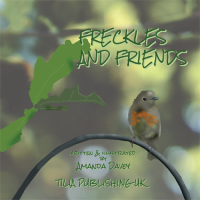 The writing bug has bitten. There is something really good about having your words sandwiched in smart covers and sitting on a bookshelf. The latest manifestation has been Freckles and Friends: true stories of garden wildlife. There are echoes of Felicity Terrace, I suppose, but it has a wider relevance. It was massively outside my comfort zone to do, but that's not necessarily a bad thing.
The writing bug has bitten. There is something really good about having your words sandwiched in smart covers and sitting on a bookshelf. The latest manifestation has been Freckles and Friends: true stories of garden wildlife. There are echoes of Felicity Terrace, I suppose, but it has a wider relevance. It was massively outside my comfort zone to do, but that's not necessarily a bad thing.
The next book is to be on the churches of the South Downs and is back in the comfort zone of landscape with photograhs and research. There are more to come. Several years ago I wrote a list of books that I intended to write and I've yet to start on any of those!
So. What have I been 'trying to say'? Very simple. That there are no rules just experiences. If it matters to you - go for it!

Add a comment: